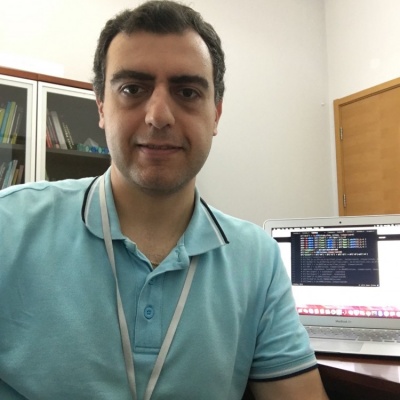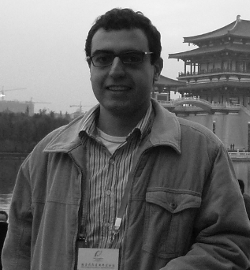Ahmet Goncu

By: Reagan Creamer
Many students at Florida State University often wonder where their education will take them following graduation. For Dr. Ahmet Goncu, it was China.
Dr. Goncu currently serves as an associate professor at Xi'an Jiaotong-Liverpool University in Suzhou, China. Working in the Department of Mathematical Sciences, he has been with the school since 2011.
"I started in economics," he said. "And then I wanted to switch to something a bit more quantitative than economics, so I was more interested in financial mathematics."
While searching for graduate degree programs, Dr. Goncu found FSU's Department of Mathematics.
"FSU had a great curriculum," he said. "And a great location. I started doing more research and found that the professors had very good profiles and academic backgrounds, so I applied."
In 2004, Dr. Goncu began studying financial mathematics at Florida State University. As a student, he worked as a teaching assistant for five years, instructing courses such as pre-calculus and trigonometry. At FSU, he earned both his Master's of Science and PhD in Mathematics.
"You can improve your intellectual and problem-solving skills if you study mathematics," he said. "FSU, of course, offers a very good program in this regard, compared to many other programs. If students take the chance to attend, it will give them opportunities for the rest of their lives."Ahmet Goncu
Following his 2009 graduation, he began searching for a job.
"I applied to mainly academic positions within the United States around the globe," he said. "I got a few offers and began interviewing in different countries such as Korea and China."
After a few rounds of interviews, Dr. Goncu landed a position as an assistant professor at Shandong University. Living in Jinan, China, he worked for the Center for Economic Research within the university for two years.
In 2011, he moved to Suzhou, thirty minutes west of Shanghai, to begin teaching at Xi'an Jiaotong-Liverpool University. As part of the Department of Mathematical Sciences for nearly five years, Dr. Goncu reflects on what made him want to join the university in the first place.
"One of the most important reasons that I came to my current institution is because of their financial math programs," he said. "They have an undergraduate program, and started the graduate program about five years ago, and I got to be a part of that."
In its early stages, Dr. Goncu served as the director of the graduate program, and currently instructs computational finance courses. He has taught courses such as Linear Statistical Models, Numerical Computation, and Computational Methods in Finance.

In addition to teaching he has taken on roles such as the Director of Research Institute of Quantitative Finance and as the Group Head of Research and Postgraduate Studies. In both of these positions, Dr. Goncu strives to provide students with real world experiences in the finance industry.
"The research institute basically is trying to develop some applied projects related to the financial industry," he said. "We also try to connect the financial industry with our program and with our students, so they can, for example, provide internships for the students. We also try to do research for the companies and organize research events."
Within his position, Dr. Goncu has also been able to continue his own research and use it to help his students.
"My research focus has also changed in the past few years," he said. "I started to do Monte Carlo Simulations when I was working with Professor Ökten at FSU. But right now, for example, I am doing artificial intelligence and machine learning type of research in finance."
In his graduate courses, Dr. Goncu includes his students in his research and encourages them to conduct their own. His new research focus area, artificial intelligence, has become especially demanded within the financial industry in China, he says.
"This gives students extra motivation," he said. "Because when I teach my students they are really motivated if the topic or the content is really demanded by companies or by the industry. So that is extra motivation for the new researchers. This area has lots of potential and, as we all know, it's rapidly changing every aspect of our lives."
By modifying his research area, Dr. Goncu has been able to provide his students with an opportunity to study one of the most in demand areas of financial math. He credits his adaptability to his experience at FSU.
"Studying at FSU was great, because it made me very versatile in terms of skill set," he said. "It has made me quite adaptable. Because of this, I have been able to work with many different people in different environments."
Moving to Tallahassee, Florida from Istanbul, Turkey was quite an adjustment for Dr. Goncu during his graduate years. However, it helped to prepare him for his future international endeavors.
"It was an international environment for me," he said of Tallahassee. "I mean, coming from Turkey to FSU, and now I've gone to a totally eastern part of the world. It increased my adaptability to new cultures or new environments. It's a lot of changes, but because of these skills developed at FSU, I was able to adapt quite easily."
Studying mathematics at FSU not only helped Dr. Goncu adjust to new living and working environments, but also to different fields and areas of research.
"Once you have a solid understanding in mathematics, you can easily solve different types of problems in all kinds of fields," he said. "You can switch your attention later to some other areas, and that's not going to be a difficult task for you."
According to Dr. Goncu, learning how to acclimate to new areas and new environments was one of the most valuable things he learned at FSU. Nearly a decade after graduating, he encourages potential students to consider attending his alma mater.
"You can improve your intellectual and problem-solving skills if you study mathematics," he said. "FSU, of course, offers a very good program in this regard, compared to many other programs. If students take the chance to attend, it will give them opportunities for the rest of their lives."

